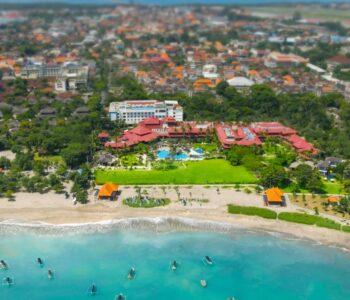Christmas may come as a ‘quiet’ day here in Bali as a predominantly Hindu island. Yet, tucked away in the Jembrana regency side of the almost 20,000-hectare West Bali National Park, one could find a little Christmas surprise package. Yes, the western Bali villages of Palasari and Blimbingsari, areas known as the dwelling place of a king of evil, are where to head if you feel like unwrapping your Christmas presents in a traditional Balinese style.
Bali is known as the island of a thousand temples. It is, therefore, quite surprising that the Catholic church of Palasari and Protestant church of Blimbingsari are standing proud, taking the place of the Hindu temples in serving their native Balinese patrons.

Palasari is a pretty Catholic Balinese village with its Gothic church, which looks like it was carried here from Europe on the wings of angels. Discovering Palasari, a village snoozing in the afternoon sun, wrapped on all sides by jungle, coconut palms and cacao trees, is like being in a picture book. Yet, how the village evolved into its present state is not such a pretty story.
Wayan, a senior resident of Palasari, said the establishment of the village dated back nearly 80 years ago when Bali’s early Christians were expelled out of their native villages. “I can still remember how my parents were carrying me, leaving our village in Tabanan when I was around five years old,” said Wayan, adding that her family along with others from different parts of Bali were forced to move to this area. Wayan explained that the area where the Palasari village currently nestles was known as Alas Rangda, the dwelling place of the king of evil.

The Catholic Palasari is breathtaking with its church set on the village’s town square. The architecture is Gothic but showcases Balinese touches in the spires, which resembles the Meru (multi-roofed shrine) in a Hindu temple, and features a facade with the same shape as a temple gate. During certain occasions, visitors can find some locals selling figurines of Jesus outside the church. Some 100 metres away from the church is Goa Maria, cave of Maria, a pilgrimage site overlooking the rich greenery of the surrounding hills.
The next door Protestant village of Blimbingsari also shares the same story, with the village’s first generation that consisted of around 20 families from all around Bali. This little, quaint village, with its manicured gardens and the colourful bougainvillea flowers, is so quiet that the voices of choristers practicing can be heard everywhere. “The people of our native villages thought the forests surrounding Blimbingsari were full of evil spirits and ghosts, and that we would die here. But now, as you can see, this place is really beautiful,” said Rempug, a third generation member of the Blimbingsari village.

Though the church in Blimbingsari is not as extravagant as the one in Palasari, it is still an amazing structure with features rendered in a distinctly Balinese style – instead of a church bell, there’s a Balinese Kulkul (warning drum) like those in a Hindu temple. The entrance is through an Aling-aling (guard wall) gate, and the carved angels adorning the church look very Balinese.
Anyway, as in all Christian communities, Christmas is an important holy day on the calendar of these villages, and a day for family and community to come together. Freshly cooked pigs, skilfully decorated Balinese Penjor bamboo poles, and traditional Balinese attires for both men and women such as sarong, Udeng headwear, Kebaya dress and sash are the order of the day. “Yes we are Christians, but we are still Balinese in many ways. That’s why we still follow our Balinese traditions. For Christmas, everyone builds a Penjor, and two days before Christmas we slaughter pigs for the Christmas meal. On Christmas Day, we take the food to our church and share our Christmas dinner,” Rempug explained.

Today, the two villages are surrounded by Hindu and Muslim communities. Rempug claimed that region should be made as a model for religious tolerance, pointing out that people of differing belief systems share their jungle village homes with respect and sincere friendship.
“Despite our differences, we get along very well. There is no such thing as religious intolerance here. This kind of harmony is exactly what we wish for our Christmas present. If only we could beautifully wrap it, we would send it to just about everyone on Christmas Day,” Rempug concluded.







